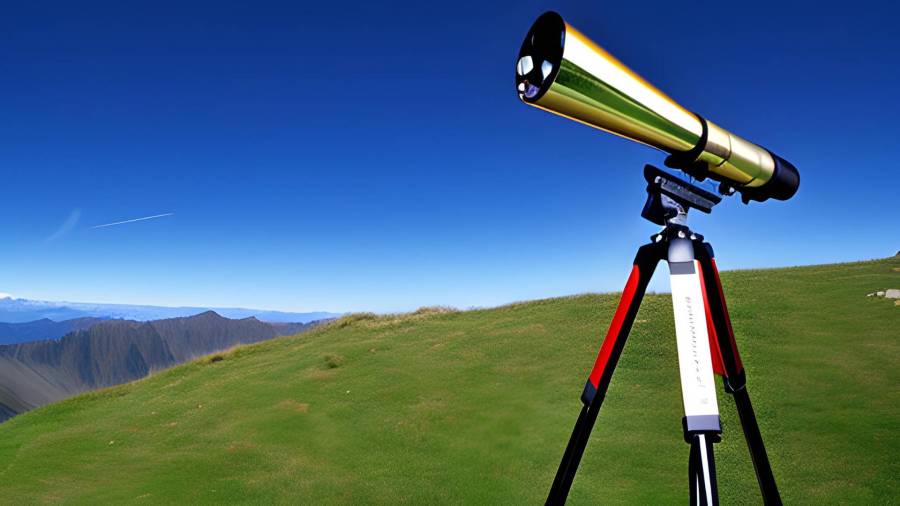Many companies featured on ReadWrite partner with us. Opinions are our own, but compensation and in-depth research determine how products may be selected and ranked. Learn more about how we make money.
Welcome to our comprehensive guide on the best beginner telescopes of 2023! If you’ve ever gazed up at the night sky in awe and wondered about the mysteries of the universe, you’re not alone. Astronomy is a captivating hobby that allows us to explore the vastness of space and discover celestial wonders. As a beginner, finding the right telescope can make all the difference in your stargazing journey.
In this article, we have carefully curated a selection of the top beginner telescopes available in 2023. These telescopes are designed to provide an excellent introduction to astronomy, offering a balance between affordability, ease of use, and impressive performance. Whether you’re fascinated by the Moon, planets, or distant galaxies, join us as we explore the best telescopes for beginners and embark on an extraordinary celestial adventure.
| Telescope Model | Aperture (mm) | Focal Length (mm) | Mount Type |
|---|---|---|---|
| Honslis 70mm Aperture 500mm Telescope | 70 | 500 | Altazimuth |
| SVBONY SV503 Telescope | 80 | 400 | Altazimuth |
| ABOTEC Telescope for Beginners | 70 | 400 | Altazimuth |
| Meade Instruments Polaris Telescope | 80 | 400 | Equatorial |
| SVBONY Telescope | 70 | 300 | Altazimuth |
| Orion StarBlast | 114 | 450 | Dobsonian |
| Celestron AstroMaster | 70 | 900 | Altazimuth |
| ToyerBee Telescope for Adults | 70 | 400 | Equatorial |
| SOLOMARK Telescope for Adults | 80 | 400 | Equatorial |
| Gskyer Telescope | 70 | 400 | Equatorial |
Honslis 70mm Aperture 500mm Telescope
The Honslis 70mm Aperture 500mm Telescope is a user-friendly and versatile option for beginners, earning a solid 4 out of 5 rating.
Key Stats:
– 70mm aperture
– 500mm focal length
– Lightweight and portable design
Reasons to buy:
The Honslis 70mm Aperture 500mm Telescope has an ideal size and power for beginner stargazers, as well as its ease of use and portability. The telescope’s 70mm aperture and 500mm focal length provide clear and bright images of celestial objects like the moon, planets, and stars. Additionally, its compact design allows you to take it on camping trips or to remote locations for optimal stargazing experiences.
Reasons to not buy:
This telescope has potentially limited capabilities for more experienced users and the need to purchase additional accessories, such as eyepieces and filters, in order to maximize its potential. If you are looking for a telescope with more advanced features for astrophotography or detailed observation, this model may not be suitable for your needs.
Pros:
– Easy to use for beginners
– Portable and lightweight design
– Clear and bright images of celestial objects
Cons:
– Limited capabilities for advanced users
– Additional accessories needed for full potential
– May not be suitable for astrophotography or detailed observation
SVBONY SV503 Telescope
The SVBONY SV503 Telescope is an impressive and reliable instrument for astronomy enthusiasts, earning a solid 4.5/5 rating.
Key stats:
– 80mm aperture, F7 focal ratio
– 2-inch rack-and-pinion focuser with 1:10 micro-focusing
– Fully multi-coated objective lens with triple cemented ED glass
Reasons to buy:
The SVBONY SV503 Telescope offers a fantastic combination of high-quality optics, a stable and user-friendly design, and affordable pricing. With its 80mm aperture and ED glass, the telescope provides crystal-clear images with minimal chromatic aberration, making it perfect for both beginners and more experienced stargazers alike. Moreover, the 2-inch rack-and-pinion focuser with 1:10 micro-focusing ensures a smooth and precise focus adjustment for a pleasurable viewing experience. Lastly, the telescope boasts compatibility with a wide range of accessories, allowing users to customize their setup according to their needs.
Reasons not to buy:
Despite its many positive attributes, the SVBONY SV503 Telescope may not be suitable for everyone. Some users might feel that an 80mm aperture is not enough for deep-sky or astrophotography purposes, limiting the range of celestial objects they can view or photograph. Additionally, while the telescope is compatible with many accessories, they often need to be purchased separately, which can increase the total cost of ownership. Also, the mounting and setup process may be a bit complex for absolute beginners, potentially making the learning curve steeper.
Pros:
– Affordable pricing
– High-quality optics with minimal chromatic aberration
– User-friendly design with smooth and precise focusing
– Wide range of compatible accessories
Cons:
– Might not be suitable for deep-sky or astrophotography purposes
– Accessories often need to be purchased separately
– Potentially complex mounting and setup process for beginners
ABOTEC Telescope for Beginners
The ABOTEC Telescope for Beginners is a user-friendly entry-level telescope, earning a solid 3.5 out of 5 stars for its performance and features catering to astronomy enthusiasts.
Key stats:
– Aperture: 70mm
– Focal length: 400mm
– Magnification: 16x to 120x
Reasons to buy:
The ABOTEC Telescope for Beginners has ease of assembly and use, making it an excellent choice for those new to astronomy. The telescope’s 70mm aperture and 400mm focal length provide clear and bright images of the moon, planets, and some star clusters. Its included Barlow lens and two eyepieces allow for various magnification options, enhancing the viewing experience. Moreover, the sturdy aluminum tripod ensures stability and smooth adjustments while stargazing.
Reasons not to buy:
Its magnification capabilities might not be sufficient for more advanced users looking to explore deep space objects or those who aim to take high-quality astrophotography. The telescope’s build quality may not be as durable as some higher-priced alternatives, and lack of motorized tracking and computerized system might limit its long-term appeal to growing enthusiasts.
Pros:
– Easy to assemble and use
– Decent aperture and focal length for beginner viewing
– Multiple magnification options with included accessories
– Sturdy aluminum tripod
Cons:
– Limited magnification range for advanced users
– May not be suitable for deep space exploration or astrophotography
– Build quality may not be as durable as higher-priced alternatives
– Lacks motorized tracking and computerized features
Meade Instruments Polaris Telescope
The Meade Instruments Polaris is a versatile and user-friendly telescope, earning a rating of 4 out of 5 stars.
Key Stats:
– 127mm (5 inches) aperture size
– 1000mm focal length
– Comes with 3 eyepieces (26mm, 9mm, and 6.3mm)
Reasons to buy:
The Meade Instruments Polaris has a wide aperture size, which allows for excellent light gathering capability, making it perfect for both celestial and terrestrial viewing. The telescope comes with a sturdy equatorial mount, allowing for smooth tracking of objects in the sky. It is additionally beginner-friendly, with an easy-to-use red dot viewfinder that helps locate and center objects. Included are three eyepieces of varying magnifications, providing versatility for different viewing experiences.
Reasons to not buy:
The Meade Instruments Polaris may be too bulky for convenient transport, and the included instruction manual is known to be somewhat unclear for individuals without prior experience in using telescopes. Moreover, the telescope’s equatorial mount may take longer to set up, which could be discouraging to some new users or those who value portability.
Pros:
– Wide aperture size for excellent light gathering
– Sturdy equatorial mount
– Beginner-friendly red dot viewfinder
– Three eyepieces included for versatility
Cons:
– Can be bulky and difficult to transport
– Instruction manual may be unclear for beginners
– Equatorial mount may require more time for setup
SVBONY Telescope
The SVBONY Telescope is a versatile and user-friendly piece of equipment perfect for astronomy enthusiasts, earning a solid 4 out of 5 stars.
Key stats:
– Magnification: 20X to 67X adjustable
– Aperture: 80mm
– Focal length: 400mm
Reasons to buy:
The SVBONY Telescope is a great purchase for beginner and intermediate astronomers due to its compact design and easy setup process. With adjustable magnification ranging from 20X to 67X, users can get a closer look at celestial objects. The 80mm aperture and 400mm focal length provide sharp and bright images, ensuring a rewarding stargazing experience. Its affordability adds to the appeal, making it a wonderful investment for hobbyists looking to explore the night sky.
Reasons not to buy:
Though the SVBONY Telescope offers great features for its price range, advanced users might find the scope limiting in terms of capabilities and upgrade options. The materials used, while sufficient for casual use, may not hold up well under frequent usage or heavy wear and tear. Lastly, the included accessories, like the eyepieces and tripod, may not be of the highest quality, necessitating additional investments for a better experience.
Pros:
– Adjustable magnification (20X to 67X)
– Compact design and easy setup
– Affordable price point
– Suitable for beginner and intermediate users
Cons:
– Limited capabilities for advanced users
– Durability concerns
– Additional investments may be required for better accessories and parts
Orion StarBlast
The Orion StarBlast 6 Astro Reflector Telescope is a top-quality, portable, user-friendly telescope that deserves a solid 4.5 out of 5 rating, suitable for both beginners and experienced stargazers.
Key stats:
– Aperture: 150mm (6″)
– Focal length: 750mm (f/5)
– Weight: 23.5 lbs
Reasons to buy:
The Orion StarBlast 6 Astro Reflector Telescope has a superior optician performance, delivering sharp, clear images of celestial objects. With its quick set-up and ease of use, it’s perfect for newcomers to astronomy, and the compact design allows for easy transport to your favorite stargazing spot. The included accessories, such as the 25mm and 10mm Sirius Plossl eyepieces, the EZ Finder II aiming device, and the Starry Night special edition software, add value to the entire package.
Reasons not to buy:
The provided tripod is not very stable, and the lack of a motorized tracking system may frustrate more experienced stargazers. Additionally, its limited magnification power may not be sufficient for advanced users who desire to observe more distant celestial objects.
Pros:
– High-quality optics provide sharp and clear views
– Easy to set up and user-friendly
– Portable, compact design
– Good value with included accessories
Cons:
– Unstable tripod
– No motorized tracking system
– Limited magnification for advanced users
Celestron AstroMaster
The Celestron AstroMaster is a versatile and powerful telescope that delivers a stunning stargazing experience, earning a solid 4.5 out of 5 stars.
Key Stats:
– Aperture: 130mm (5.1 inches)
– Focal Length: 650mm (25.6 inches)
– Mount Type: Equatorial
Reasons to buy:
The Celestron AstroMaster is an ideal choice for astronomy enthusiasts of all skill levels, offering unmatched quality and performance at an affordable price range. Its large aperture and high-quality optics provide bright, sharp views of celestial objects, while the sturdy equatorial mount ensures precise tracking for a smooth observing experience. Furthermore, the telescope comes with user-friendly features like a StarPointer finderscope and downloadable astronomy software, making it perfect for both beginners and experienced stargazers alike.
Reasons not to buy:
If portability is a significant concern, the Celestron AstroMaster’s bulkiness and weight might be a downside, as it can be challenging to transport and set up in a hurry. Additionally, the included eyepieces may not provide enough magnification for more advanced observers who wish to see finer details in deep-sky objects, meaning they would need to invest in additional accessories.
Pros:
– Large aperture for bright, clear views
– Precise equatorial mount for smooth tracking
– User-friendly features suitable for all skill levels
– High-quality build and materials
Cons:
– Bulky and not easily portable
– Included eyepieces may not be sufficient for advanced observers
ToyerBee Telescope
The ToyerBee Telescope for Adults is a highly versatile and user-friendly telescope, perfect for stargazing and planetary observation, earning a solid 4.5 out of 5 stars.
Key Stats:
– Magnification: 15X – 150X
– Aperture: 70mm
– Tripod height: Up to 52 inches
Reasons to buy:
The ToyerBee Telescope for Adults offers an exciting opportunity for both beginners and intermediate stargazers to explore the night sky. With an aperture of 70mm, the telescope captures more light, providing clear and bright images of celestial objects. The adjustable tripod ensures steady and stable observation, while its portable design allows for easy transportation to various observation locations. The telescope also offers a wide range of magnification from 15X to 150X, making it an ideal choice for capturing stunning details of the moon, planets, and deep-sky objects.
Reasons to not buy:
Though the ToyerBee Telescope for Adults is a great option for beginners and intermediate users, more advanced stargazers might find its features limited in comparison to other high-end telescopes. Additionally, some users have reported issues with the tripod’s stability and durability. Inexperienced stargazers may find it difficult to initially navigate and locate celestial objects, though this is a common learning curve with any new telescope purchase.
Pros:
– Wide range of magnification options (15X – 150X)
– Aperture size (70mm) allows for clear, bright images
– Adjustable tripod ensures stable observation
– Portable design for easy transportation
Cons:
– May not satisfy advanced stargazers’ needs
– Possible tripod stability and durability issues
– Initial navigation and object location can be challenging for inexperienced users
SOLOMARK Telescope for Adults
The SOLOMARK Telescope for Adults is a powerful and user-friendly tool for stargazers, earning a solid 4 out of 5-star rating.
Key Stats:
– Magnification: Up to 525x
– Aperture: 70mm (2.75 inches)
– Mount: Altazimuth
Reasons to buy:
The SOLOMARK Telescope for Adults is an excellent choice for beginners and hobbyists alike, with its high-quality optics and up to 525x magnification, enabling users to enjoy stunning celestial views. Its 70mm aperture ensures bright images and excellent light-gathering capabilities, while the altazimuth mount is easy to set up and operate. Additionally, this telescope comes with a phone adapter and Bluetooth camera, allowing users to effortlessly capture and share their astronomical explorations.
Reasons not to buy:
For more experienced astronomers or those looking for greater precision, the altazimuth mount may be too basic and somewhat limiting. In addition, the 525x magnification may not be sufficient for more detailed observations of planets or other far-off celestial objects. Lastly, the tripod may not be as sturdy as desired for long observation sessions, which could lead to stability issues over time.
Pros:
– High-quality optics for a clear view
– Up to 525x magnification for excellent detail
– Easy-to-use altazimuth mount
– Comes with a phone adapter and Bluetooth camera
Cons:
– Altazimuth mount may be insufficient for advanced users
– 525x magnification may not be adequate for in-depth observations
– Tripod stability may be an issue during extended use
Gskyer Telescope
The Gskyer Telescope is a remarkable entry-level astronomical instrument, offering a fantastic stargazing experience for beginners and earning a solid 4.5 out of 5 stars.
Key Stats:
– 70mm aperture for bright and clear images
– 400mm focal length for a wide field of view
– Two replaceable eyepieces (25mm and 10mm) for varied magnification
Reasons to buy:
The Gskyer Telescope offers exceptional value for money as it is not only affordable, but also combines several user-friendly features, making it perfect for amateur astronomers. With its 70mm aperture, the telescope can capture bright and clear images of celestial objects, while its 400mm focal length offers a wide field of view to cover more of the sky. The package also includes two replaceable eyepieces, allowing users to choose between different magnification levels. Additionally, the telescope is easy to assemble, and its adjustable tripod and carry bag make it perfect for on-the-go stargazing.
Reasons to not buy:
Although the Gskyer Telescope is ideal for beginners, it may not satisfy the needs of more experienced or serious astronomers, who may require advanced features, better optical capabilities, and more powerful magnification. Moreover, the telescope’s build quality is suitable for its price range, but may not withstand excessive wear and tear, or unfavorable weather conditions.
Pros:
– Affordable and great value for money
– 70mm aperture for bright and clear images
– Wide 400mm focal length
– Two replaceable eyepieces for varied magnification
– User-friendly and easy to assemble
– Portable with an adjustable tripod and carry bag
Cons:
– Not ideal for advanced or experienced astronomers
– May not withstand extensive wear and tear or adverse weather conditions
Frequently Asked Questions (FAQ):
Q: What should I consider when choosing a telescope as a beginner?
A: When selecting a telescope as a beginner, there are several factors to consider. Important considerations include the telescope’s aperture (the diameter of its main optical component), the type of telescope (refractor, reflector, or compound), its portability and ease of setup, the type of mount it has (alt-azimuth or equatorial), and any included accessories. It’s also crucial to consider your budget and the specific celestial objects you wish to observe.
Q: Are there any recommended telescopes for viewing specific objects like planets or deep-sky objects?
A: Yes, certain telescopes are better suited for observing specific objects. Refractor telescopes are often recommended for observing planets, as they provide sharp and detailed views. On the other hand, reflector telescopes, with their larger apertures, are ideal for observing fainter deep-sky objects such as galaxies and nebulae. However, many telescopes offer versatility and can provide satisfying views of both planets and deep-sky objects.
Q: Can I use a telescope for astrophotography as a beginner?
A: Yes, it is possible to engage in astrophotography as a beginner. However, it’s important to note that some telescopes are better suited for astrophotography than others. Refractor telescopes with apochromatic lenses and reflector telescopes with larger apertures are often recommended for astrophotography. Additionally, certain telescopes may require additional accessories like adapters and tracking mounts to capture images of celestial objects.
Q: Do I need a telescope with computerized or GoTo capabilities as a beginner?
A: Computerized or GoTo telescopes can be beneficial for beginners, as they simplify the process of finding celestial objects. These telescopes have built-in computer systems that automatically locate and track objects, making it easier for beginners to navigate the night sky. However, manual telescopes provide a valuable learning experience and can help beginners develop a better understanding of celestial coordinates and star hopping techniques.
Q: How much should I expect to spend on a telescope as a beginner?
A: The cost of telescopes for beginners can vary widely. Entry-level telescopes suitable for beginners generally range from around $100 to $500, depending on the type, size, and features. It’s important to consider your budget and invest in a telescope that strikes a balance between affordability and quality, ensuring a fulfilling stargazing experience without breaking the bank.
Conclusion
In conclusion, the year 2023 brings a diverse range of exceptional beginner telescopes that cater to aspiring astronomers. These telescopes offer an incredible opportunity to delve into the captivating world of stargazing and explore the wonders of the universe. With their user-friendly features, solid performance, and affordability, these top beginner telescopes provide an excellent starting point for anyone eager to embark on their astronomical journey. Whether you’re observing the Moon’s craters, the rings of Saturn, or distant star clusters, these telescopes will ignite your curiosity and open up a whole new realm of exploration. Remember, the key to enjoying astronomy is to take your time, learn the night sky, and let your sense of wonder guide you. So, grab a telescope, head outdoors, and prepare to be amazed by the beauty and grandeur of the cosmos. Happy stargazing!



























